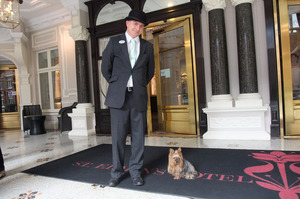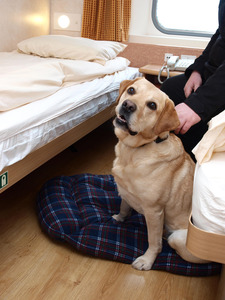Parasite protection
 Although the rules have made it easier to travel outside the UK with your pet, it is important to check with your vet that you have the proper parasite protection. Leishmania is rife in counties such as Spain and Portugal so make sure your pet has had the right vaccination. Unfortunately this needs to be done at least ten weeks before you travel.
Although the rules have made it easier to travel outside the UK with your pet, it is important to check with your vet that you have the proper parasite protection. Leishmania is rife in counties such as Spain and Portugal so make sure your pet has had the right vaccination. Unfortunately this needs to be done at least ten weeks before you travel.
Belt up
Seat belts are not just for human beings. If you are travelling by car and have an accident your animal could easily be thrown through the window. Safety belts, similar to harnesses that go around the animal’s body, have a clip that goes into the car seatbelt socket. These are generally available at your local pet shop.
In some countries allowing your dog to sit in the front passenger seat is illegal. If you aren’t sure, it’s wiser to make it sit at the back.
Restaurant rules
 In Western Europe, well-behaved dogs are usually allowed in restaurants, particularly in France. However, there is always the exception to the rule, and it’s worth enquiring before you go in or book. I have at times been surprised when a ‘boulangerie’ has made Trixie wait outside where-as a really chic eaterie has brought her a bowl of water without asking!
In Western Europe, well-behaved dogs are usually allowed in restaurants, particularly in France. However, there is always the exception to the rule, and it’s worth enquiring before you go in or book. I have at times been surprised when a ‘boulangerie’ has made Trixie wait outside where-as a really chic eaterie has brought her a bowl of water without asking!
Beach code
As in Britain, dogs are only allowed on popular beaches at certain times of the year particularly at peak periods. Do check, as you could land up with a fine.
Time for a trim?
Cutting a dog’s hair if it’s hot won’t particularly help the animal unless it has a thick, and heavy coat.
Air and water
 Make sure that there is enough ventilation for your animal if it in an enclosed space. Important too is that they have access to plenty of water. If you are travelling by car, you might consider buying solar shades for the windows.
Make sure that there is enough ventilation for your animal if it in an enclosed space. Important too is that they have access to plenty of water. If you are travelling by car, you might consider buying solar shades for the windows.
In a heat stroke situation, putting a towel that has been immersed in cold water on their body will bring down the temperature.
Check the vet
Where ever you go, check out where the local vet is located, and book your appointment in advance for the return journey.
The vet needs to be visited a minimum of 24 hours and up to five days before the return trip for a worming pill, details of which are recorded in your Pet’s Passport. If the trip is short, and within the time frame, your pet can have this done at its own vet in the UK!
Ferries and airlines
 Depending on your departure point, if part of your journey is by ship, you are usually obliged to leave your animal in the car. However, several ferry lines also have kennels particularly on the longer crossings. For anyone travelling by Stena Lines, which have overnight crossings from Harwich to the Hook of Holland, they have flat screen televisions in the cabins. Owners can tune into the Kennel Channel to keep an eye on their pets during the voyage. On their Portsmouth to Le Havre, Santander and Bilbao routes, Brittany Ferries allow pets in their pet friendly cabins, which need to be booked in advance.
Depending on your departure point, if part of your journey is by ship, you are usually obliged to leave your animal in the car. However, several ferry lines also have kennels particularly on the longer crossings. For anyone travelling by Stena Lines, which have overnight crossings from Harwich to the Hook of Holland, they have flat screen televisions in the cabins. Owners can tune into the Kennel Channel to keep an eye on their pets during the voyage. On their Portsmouth to Le Havre, Santander and Bilbao routes, Brittany Ferries allow pets in their pet friendly cabins, which need to be booked in advance.
Not all airlines are allowed to transport live animals in and out of the UK. Even when they do the animal, unless it is an assistance dog, will be relegated to the hold.
If you are unsure about anything regarding the welfare of your pet, don’t hesitate to ask your vet or more probably the practice nurse who is likely to be well versed on the subject.
Full details of what you can and can’t do are available on Defra (now GOV.UK).
Pet helpline: 0870 2411710
Sawdays offers pet-friendly holidays.
Chien Bleu is dedicated to dog-friendly holidays.
There are also different agencies in the UK arranging the logistics for people travelling abroad with pets, including Petair and Petravelagent. More information can be obtained from the International Pet and Animal Transportation Association.











